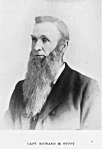Richard H. Stott
 CAPT. RICHARD H. STOTT. Cherokee County lost one of her most worthy and honored
citizens in the death of Capt. Richard H. Stott, whose life closed at his home
in Columbus, April 2, 1899. He was born at Vernon, Jennings County, Indiana, in
1836, and was a son of Richard and Polly (Allen) Stott.
CAPT. RICHARD H. STOTT. Cherokee County lost one of her most worthy and honored
citizens in the death of Capt. Richard H. Stott, whose life closed at his home
in Columbus, April 2, 1899. He was born at Vernon, Jennings County, Indiana, in
1836, and was a son of Richard and Polly (Allen) Stott.
Captain Stott's parents were natives of Lawrenceburg, Kentucky, but both died at Vernon, Indiana, his father, aged 71 years, and his mother, almost 95 years old. His father was a prominent citizen in Jennings County, which he served as sheriff, and was noted for his honesty and personal integrity. At one time he owned a farm, with a tannery and shoe store attached, as was the case with many of the substantial men of his day and locality. Coming of Scotch ancestry, he inherited all of the sturdy qualities which have marked the Scotch the world over.
The late Captain Stott was the youngest of six children, all of whom have passed away. His mental training was obtained in the public schools, and was supplemented by a commercial course at Bartlett's College, at Cincinnati. He then accepted a clerkship in a mercantile house, married in 1858, and had entered upon a successful career, when the breaking out of the Civil War brought all his plans to a close. Loyalty to his country he put before every other consideration, and he was one of the first to respond to the call for soldiers for three years, enlisting in Company H, 26th Reg., Indiana Vol. Inf., as a private in the ranks. His enlistment in August, 1861, was soon followed by promotion in camp as orderly sergeant, and soon after going to the seat of war, as second lieutenant. At the close of almost four years of most strenuous service, including capture, imprisonment and wounds, he was mustered out with the well earned rank of captain, having been promoted to that position shortly after he was made 2nd lieutenant.
Captain Stott's service was mainly confined to the territory west of the Mississippi River, and he participated in all of the campaigns in that part of the country. After a six-weeks siege at Vicksburg, where his command had fought behind the levee until all their ammunition was exhausted, he was captured by the enemy, and was incarcerated for six months at Tyler, Texas. The story of the escape of himself and one other officer is one of thrilling interest. Its details are, unfortunately, too long for the limits of the present sketch, but the narrative is filled with incidents of such courage and self-sacrifice as to stir the most sluggish soul to admiration. Of the 15 officers who managed to escape from prison bounds, he and Lieutenant Reynolds were the only ones who were not recaptured. They managed to secretly reach the home of a Union sympathizer, who at the risk of his life hid them, provided them with Confederate scrip and gave them civilian clothes. With many hardships and additional adventures, they finally reached General Franklin's headquarters, and were then transported to New Orleans. Captain Stott was given a furlough of 30 days, but returned to his command in time to take part in the capture of Mobile. He was dangerously wounded by a spent ball at Prairie Grove, Arkansas. His command was sent as a provost guard to General Polk after the battle of Corinth, which duty occupied four months, and was then sent to Batesville, Arkansas, to guard a wagon train of 1,000 oxen. His final discharge took place at Selma, Alabama, with a soldier's record of which his family may be justly proud.
Captain Stott returned to his family in Indiana, entering into business at Vernon, where he continued until 1869, when he moved to Kansas and bought a farm in Sheridan township, Cherokee County. For about 11 years he was engaged in farming and stock-raising, taking much interest in agricultural pursuits, and enjoying its labors and returns. He bought more land, his holdings aggregating 400 acres at the time of his decease, and, although he moved to Columbus in 1880, he continued to be deeply concerned with his lands and stock. His removal to the city was necessitated on account of his election, in the fall of 1879, to the office of county treasurer, which was followed by a reelection.
In 1858 Captain Stott married Mary Z. Johnson, who was born at Niles, Michigan. Captain Stott was one of the strong Republicans of this section, and Mrs. Stott earnestly shared his political zeal, having been reared in this party, with which her father was actively identified from the time of its formation.
Captain and Mrs. Stott had five children, four of whom died in infancy. One daughter, Helene (Mrs. Walter Scott), died August 17, 1902, leaving two little daughters,—Helen and Ethel,—who live with their grandmother. Mrs. Stott capably manages the large estate left by her husband. She is well known in Columbus, where she and Captain Stott were long hospitable hosts, and interested in the city's social life. A portrait of Captain Stott accompanies this sketch.
![]()
History of Cherokee County Kansas and its representative citizens, ed. & comp. by Nathaniel Thompson Allison, 1904, transcribed by Carolyn Ward, instructor from USD 508, Baxter Springs Middle School, Baxter Springs, Kansas, 6-27-97
